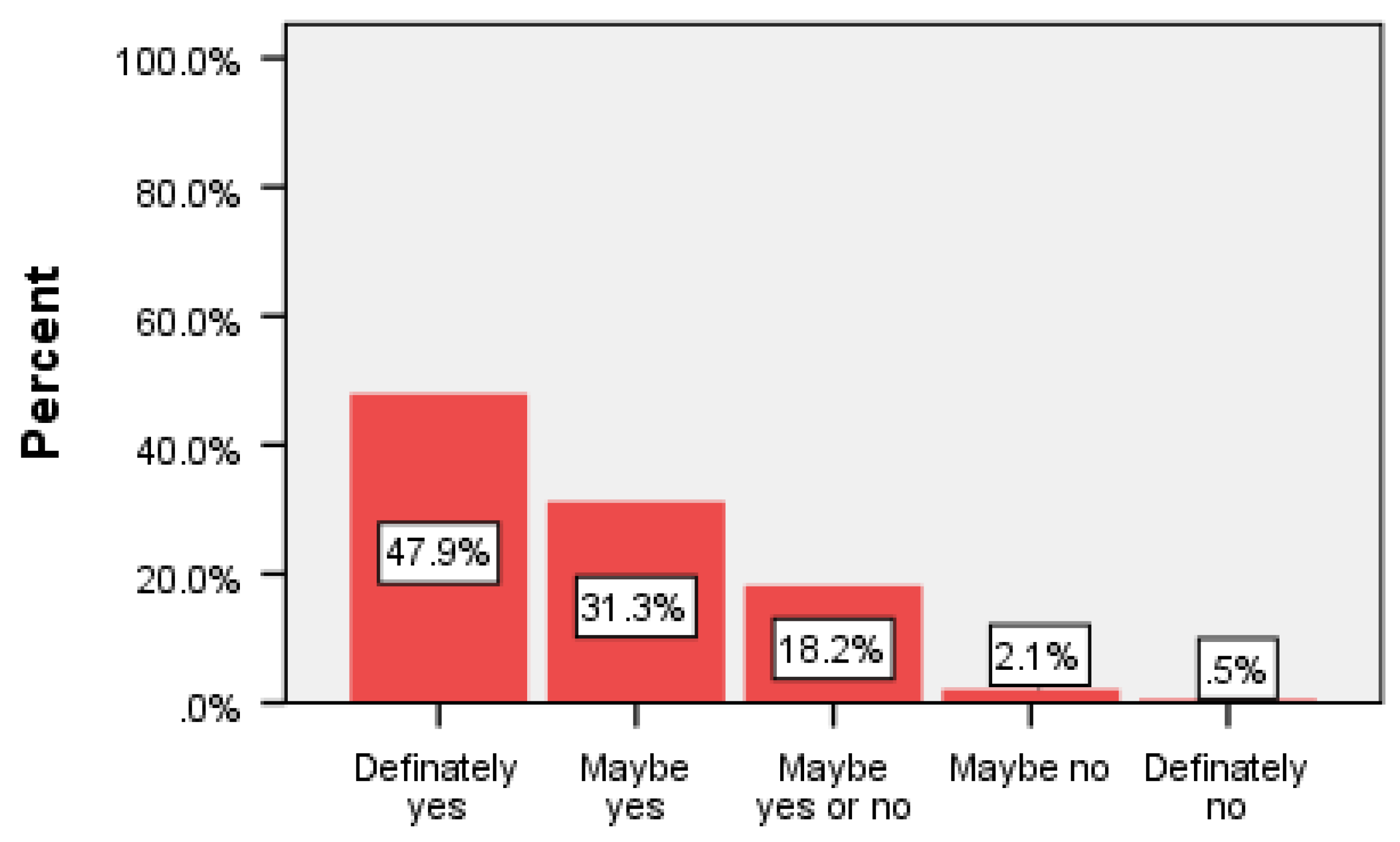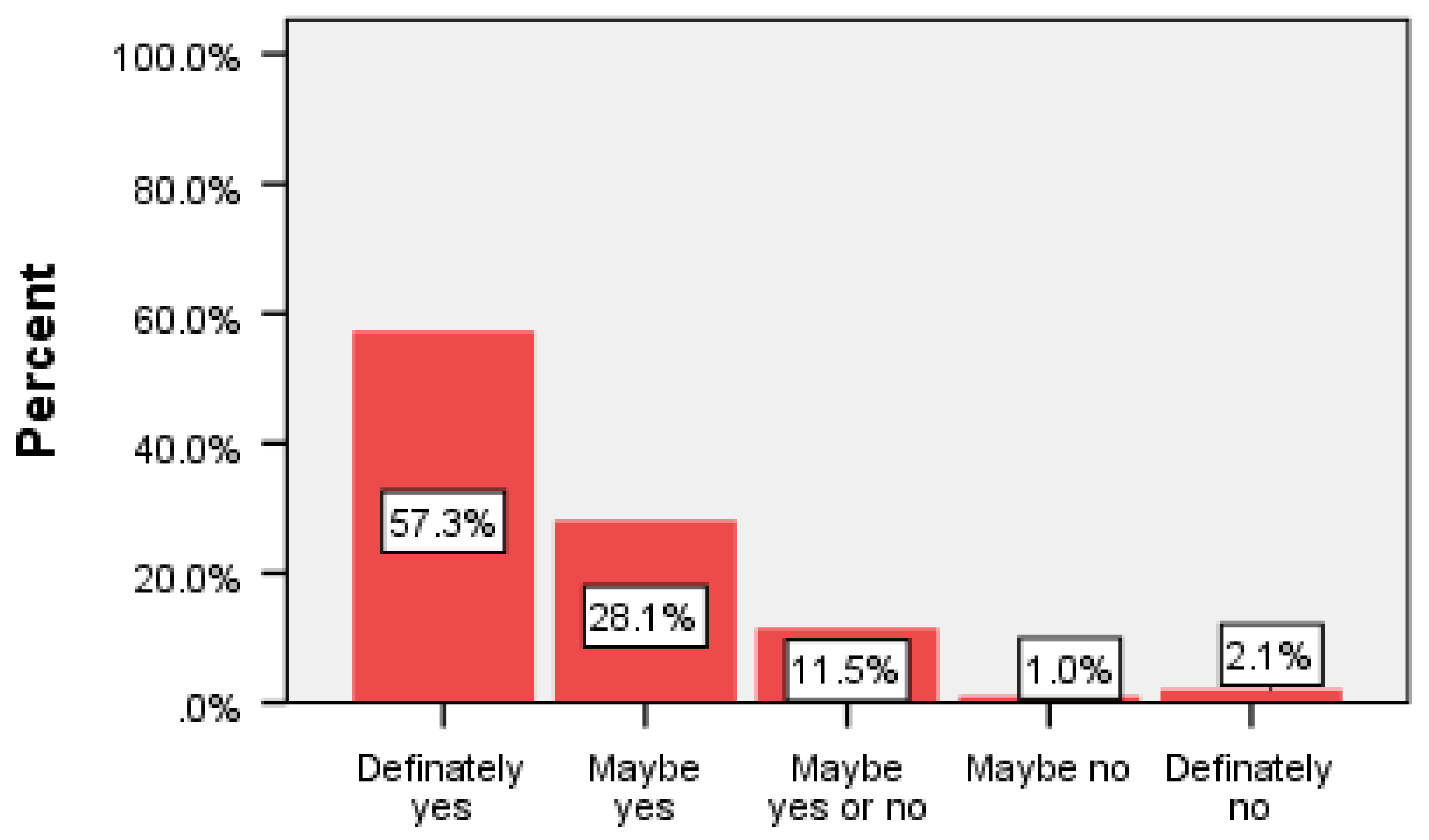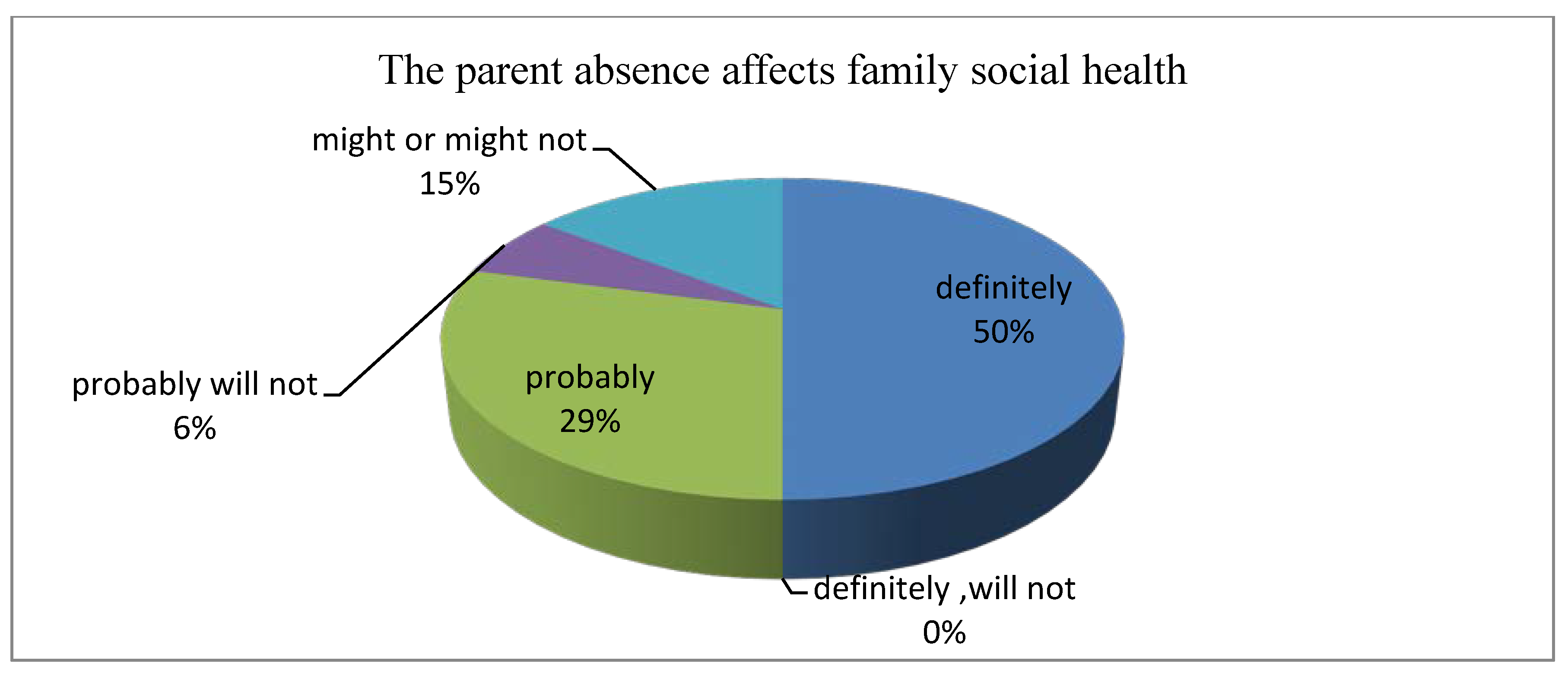1. Introduction
Parents’ behavior and practices affect many aspects of family life, including health, and many studies have proven that children's bad habits are associated with parents’ behavior and practices. One study has shown that the level of education of the mother may affect her food choices provided to the family, which may make children follow this pattern of life.[
1]
All social and psychological problems may be transmitted from one generation to another [
2], resulting in (alcoholism, smoking, eating too many harmful foods, etc. .[
3]
The psychological aspect that parents influence children through their problems. Also, their behaviors may affect children’s long-term mental health, and as for the social aspect, such as that parents follow customs and traditions, it affects children [
4].
In fact, most adults copy the behavior of their parents in two ways: consciously on one hand and subconsciously on the other hand [
5]
Studies have shown that the refusal of parents to use alcohol strengthens among children to do the same later.
In addition, the eating behaviors of family members were affected by the behavior of fathers, and this has been proven by a study that has proved the influence of parents ' eating behaviors and child feeding practices on children’s Weight Status, and has proven that most girls and boys quote mothers’ behaviors. [
6]. In December 2014, the United Kingdom’s Horizon Scanning Program published a report on the social attitudes of young people, took a closer look, and shared insights into the significant roles that parents play in shaping their children’s take-on life. The United Kingdom government’s horizon scanning program took a stab at this, publishing its report on social attitudes of young people. The report assesses whether and how the social attitudes of young people in the UK today differ from those of previous generations and how they might evolve in the future.
Based on a comprehensive review of social science research and a handful of focus groups with 41 young people, the report shows how peers, schools, communities, and hugely important parents together influence and mutually reinforce the social attitudes and aspirations of children and young people.
Socioeconomic background matters; while aspirations are generally high among young people, their parents’ socioeconomic background determines young people’s outlook on success in life. Those from disadvantaged backgrounds express lower aspirations and expectations for success.
According to research by the Prince’s Trust, 26% of young people aged 16 to 24 from poor homes felt that “people like them don’t succeed in life.” Attitudes are transferred from the parents to the children. For example, parental experiences and attitudes toward education influence a young person's likelihood of wanting to stay in further education after age 16. The Department of Education's longitudinal study of young people in England (LSYPE) recently found that 90% of 13-year-olds whose parents are in “higher managerial and professional occupations” plan to continue with school, compared to 67% whose parents have “routine occupations [
7]” routine occupations.
2. Methodology
2.1. Study design:
Descriptive cross-sectional analysis to study the influence of parents’ behavior and practices on their family health
2.2. Study area:
Faculty of Public Health and Informatics at Umm Al-Qura University in Makkah
2.3. Study period:
Study conducted during the period January- June 2022.
2.4. Study population:
50% of female students (192) at Faculty of Public health
2.5. Methods of data collection:
Questionnaire:
A well-designed, pre-tested questionnaire that fulfilled the intended objective was administered to collect the necessary data.
Observation: Observations were used to collect essential data to fulfill the research objectives.
Data analysis
Data analyzed using the statistical package for social sciences (SPSS) Version.26
Ethical clearance
This study was conducted in agreement with Helinsky's declaration of the international conference on harmonization, regulations, and laws of the country, and ethical approval was obtained from the biomedical research ethics committee of the Faculty of Medicine, Umm Al-Qura University. (12.1443), Written and verbal consent was obtained from all students. Data were used anonymously by using identity numbers instead of names to protect the participant's identity and kept securely and in a separate file. No reference to any individual participant was provided in the study reports. Only the study staff were aware of the subjects’ identities.
Research purpose and objectives were explained to female students in clear simple words
3. Results
3.2. Statistical Analysis
Software & Statistical Methods:
SPSS v26 was used to analyze survey data.
Descriptive statistics: Frequency distribution was analyzed, either in the form of tables (for the sample characteristics) or bar charts (for the main questions).
Chi-square test: This test determines whether two categorical variables are related to each other. The test contains a series of mathematical calculations that finally result in a p-value ranging between 0 and 1. If the p-value is less than .05, the relationship is significant (it seems to exist). The threshold of.05 is called the level of significance or alpha. Alpha is typically chosen to be .05 in research. It can be smaller (stricter test) or larger (lenient test).
Figure 1 Showing Parents' adherence to some customs and traditions that negatively affect their families.
Most participants (79.2%) thought that parents' adherence to some customs and traditions negatively affected their families.
Figure 2 shows that the majority of participants (85%) think that development of the cognitive and social health of families depends on the presence of supportive parents (sum of “definitely yes” and “maybe yes” is 57.3%+28.1%=85.4%).
Table 1 clarified that there is a statistically significant relationship between age and the need for distance from parents, since the p-value of the chi-square test is .017 (which is < .05).
As shown in
Table 2, the relationship between the effect of illiterate parents and their ability to be supportive parents is statistically significant, since the p-value of the chi-square test is .014 (which is < .05).
To see how this relationship is significant, we need to shrink
Table 2 and make it simple by combining rows (or columns) of “definitely yes” and “maybe yes,” as well as, the rows (or columns) of “maybe no” and “definitely no.” The results of this process are listed in table
Fifty% agreed that there is a strong relationship between the absence of a parent and the existence of effects on the social health of their families, as shown in
Figure 3.
4. Discussion
Parents’ behaviors and practices formulate the family attitudes and practices that directly affect their health status; this study clarified that more than half of the participants required some distance from their parents, which could indicate that they are experiencing an absence of complete freedom. The majority feel that the behavior of parents affects the behavior and practices of their families.
For example, the majority of them thought that parents adhering to customs and traditions may negatively affect their families, whereas supportive parents may positively build the cognitive and social health of their families. However, the most interesting finding is that although they feel that behavior and traditions may affect the psychological health of the daughter, participants (mostly) are either not relating this to the education of parents or at least unsure whether education is relevant in this matter.
It has been clarified that there is a statistically significant relationship between age and the need for distance from the parents. This portrait is generally consistent with findings from a previous study by (Hutchinson, J. W., & Stafford, E. M. 2005) who concluded that teens' privacy issues stem from trust issues. Since teens feel that they are growing into adults, they want to feel that their parents have trust in them so that they can do more and more things confidently [
8].
The study showed that there is a significant relationship between illiterate parents and their ability to support their families, clarifying that the majority of participants thought that development of the cognitive and social health of families depends on the presence of supportive parents, which has many implications on family health. This is consistent with the findings of (Green, C. M et al.2009) who clarified that parental literacy level has been associated with measures related to parenting and child developmental outcomes.[
9]
The study clarified that belief in the need for supportive parents to build the cognitive and social health of families was higher among those who believed in the negative effects of parent illiteracy. This can be noticed from the percentage of those who responded by “definitely/maybe yes” within the supportive parent questions, as it decreases gradually when we move towards the answer “definitely no” within the illiteracy questions. In addition, the study showed that negative parenting habits become a bad model for their families.
The study clarified that the development of the cognitive and social health of families depends widely on the presence of supportive parents, which is in agreement with the study by (Gaylord-Harden, N. K., & Elmore, C. A. 2012)which concluded that parental support develops children ’scognitive, social, and psychological health [
10].
The study concluded that parental behaviors and practices have a strong effect on their families’ social and psychological health, leading to many implications for family and community health in general.
Many factors, including illiteracy of the parents, overprotection, negative habits, absence from home, negative parenting habits, and being a bad model for their families, affect the family’s health. The development of cognitive and social health in families depends on the presence of supportive parents.
5. Recommendation
The study recommends the need for social and psychological health programs directed to deal with family health problems, the sensitivity of such problems indicates the privacy needed forsuch programs, which can use telephone counselling.
The service can be supported by designated health centers or hospitals for family social health.
Other partners are invited to contribute to such services as religious leaders, social workers, and community leaders in order to provide complementary services to reduce the magnitude of family social and psychological health problems.
Funding
The author declares no funds for this study.
Data Access Statement
Research data supporting this publication are available from faculty of pub-lic health, Umm Al-Qura University.KSA.
Conflicts of Interest
Author declares no conflict of interest in this study.
References
- Vereecken, C.; Keukelier, E.; Maes, L.; Influence of Mother’s Educational Level on Food Parenting Practices and Food Habits of Young Children. 19 May 2004. Available online: https://www.sciencedirect.com/science/article/abs/pii/S0195666304000431 (accessed on 15 November 2020).
- Kidwell, R.; Eddleston, K.; Kellermanns, F.; Learning Bad Habits across Generations: How Negative Imprints affect Human Resource Management in the Family Firm. 30 May 2017. Available online: https://www.sciencedirect.com/science/article/abs/pii/S1053482217300347 (accessed on 15 November 2020).
- Schönpflug, U. Introduction to Cultural Transmission: Psychological, Developmental, Social, and Methodological Aspects. 2019. Available online: https://psycnet.apa.org/record/2008-19090-001.
- Elkins, I.; Iacono, W.; Mcgue, M.; APA PsycNet. 1997, April. Available online: https://psycnet.apa.org/record/1997-07406-014 (accessed on 16 November 2020).
- Sarwar, S. Influence of parenting style on children’s behavior. J. Educ. Educ. Dev. /: Available online: https, 2882. [Google Scholar]
- Johannsen, D.; Johannsen, N.; Specker, B.; Influence of Parents' Eating Behaviors and Child Feeding Practices on Children's Weight Status. 6 September 2012. Available online: https://onlinelibrary.wiley.com/doi/full/10.1038/oby.2006.57 (accessed on 3 December 2020).
- Ottovordemgentschenfelde, S. How do parents influence their children’s attitudes to life? Parent. Digit. Future, /: online: http, 6712. [Google Scholar]
- Hutchinson, J.W.; Stafford, E.M. Changing parental opinions about teen privacy through education. Pediatrics 2005, 116, 966–971. [Google Scholar] [CrossRef] [PubMed]
- Green, C.M.; Berkule, S.B.; Dreyer, B.P.; Fierman, A.H.; Huberman, H.S.; Klass, P.E.; Mendelsohn, A.L.; Maternal Literacy and Associations between Education and the Cognitive Home Environment in Low-Incomefamilies. 2009, September. Available online: https://www.ncbi.nlm.nih.gov/pmc/articles/PMC3083977/ (accessed on 21 March 2021).
- Gaylord-Harden, N.K.; Elmore, C.A.; Influence of Supportive Parenting and Racial Socialization Messages on African American Youth Behavioral Outcomes. 2012, January. Available online: https://www.researchgate.net/profile/Noni-Gaylord-Harden/publication/257578722_The_Influence_of_Supportive_Parenting_and_Racial_Socialization_Messages_on_African_American_Youth_Behavioral_Outcomes/links/55675a2808aec2268300fbba/The-Influence-of-Supportive-Parenting-and-Racial-Socialization-Messages-on-African-American-Youth-Behavioral-Outcomes.pdf (accessed on 19 March 2021).
|
Disclaimer/Publisher’s Note: The statements, opinions and data contained in all publications are solely those of the individual author(s) and contributor(s) and not of MDPI and/or the editor(s). MDPI and/or the editor(s) disclaim responsibility for any injury to people or property resulting from any ideas, methods, instructions or products referred to in the content. |
© 2023 by the authors. Licensee MDPI, Basel, Switzerland. This article is an open access article distributed under the terms and conditions of the Creative Commons Attribution (CC BY) license (http://creativecommons.org/licenses/by/4.0/).







